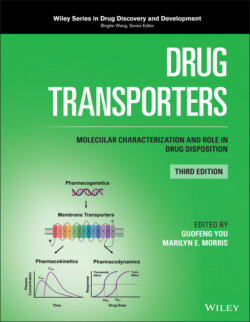Читать книгу Drug Transporters - Группа авторов - Страница 51
2.6.5 Human Genetic Studies
ОглавлениеLoss‐of‐function mutations in SLC19A2 cause a rare autosomal recessive disorder called thiamine‐responsive megaloblastic anemia (TRMA) (Online Mendelian Inheritance in Man (OMIM) #249270) [67]. Homozygotes for mutations in SLC19A2 are characterized phenotypically by non‐autoimmune diabetes mellitus, sensorineural hearing loss, and megaloblastic anemia. Interestingly, in patients with TRMA, plasma thiamine levels are within the normal range, but levels of thiamine pyrophosphate, the bioactive form of thiamine, are significantly reduced [68, 69]. Large doses of thiamine are used to treat TRMA, with improvements in megaloblastic anemia and diabetes mellitus; however, progressive hearing loss is irreversible. Individuals with TRMA require lifelong administration of thiamine.
The presence of loss‐of‐function variants in each allele of the SLC19A3 gene causes a rare autosomal recessive disorder called biotin‐responsive basal ganglia disease (OMIM #60783) [67]. This disease is associated with subacute encephalopathy with confusion, dysarthria, and dysphagia that begins in infancy. Without treatment, the disorder progresses, and patients experience a premature death. High doses of another B vitamin, biotin, eliminate these abnormalities, which do not recur if treatment is continued. Although THTR‐2 is a thiamine transporter that does not transport biotin [70], the disorder does not respond to thiamine [71]. Notably, biotin deficiency is associated with reduced expression of SLC19A3 in human leukocytes [72].
Thiamine deficiency in the setting of alcoholism is associated with Wernicke’s syndrome, which acutely includes mental confusion, ataxia, and ophthalmoplegia and later progresses to memory loss and confabulation. A Wernicke’s‐like genetic syndrome has also been associated with SLC19A3 mutations (OMIM #606152) [67]. The disorder manifests clinically in adolescence with diplopia and nystagmus progressing to seizures [73]. Affected patients are not clinically thiamine deficient but respond to high doses of thiamine.
Thus far, mutations in SLC29A4 have not been linked to a Mendelian autosomal recessive or dominant disease [67]. However, heterozygous loss‐of‐function mutations in SLC29A4 have been linked to autism spectrum disorders [74] and abnormalities in levels of serotonin and its metabolic end products. A common SLC29A4 intronic variant (rs3889348), which is associated with reduced expression of PMAT, has been linked to increased risk of metformin gastrointestinal intolerance in candidate gene studies [75].
